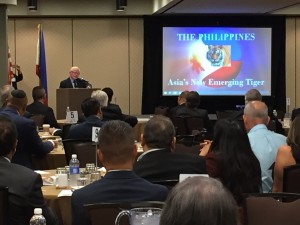
Ambassador Luis Cuisia Jr. making a presentation at the Dallas investment roadshow. CONTRIBUTED PHOTOS
WASHINGTON, D.C.—A Manila business delegation told prospective U.S. investors in Texas that the Philippine government is allocating more resources to infrastructure improvement and expansion, opening up numerous opportunities for investment in the Philippines.
Business openings in the transport and infrastructure sectors was one of the main topics during the second leg of the 4th Philippine Private Sector-led Investment Roadshow in Dallas, Texas on October 21.
Some 165 participants including senior executives from American Airlines, Fluor Corporation, Rio Grande Pacific Corporation, Texas Instruments, World Affairs Council and heads of the Fort Worth Chamber of Commerce and Greater Dallas Asian American Chamber of Commerce.
Members of the Manila business delegation agreed that the Philippines is seriously improving its infrastructure to meet demands of its economy. This is reflected in the government’s increased budget allocation to infrastructure projects.
According to Mr. Ronaldo Elepaño, first vice president for business development international at DM Consunji, Inc., the 2015 Budget invests 569.9 billion pesos in strategic infrastructure projects. Infrastructure outlays for this year represent 4 percent of the country’s GDP, a 28.95 percent increase in allocated budget from the previous year.
Additionally, 287.8 billion pesos are earmarked for transport infrastructure projects including road, maritime, air and railway transport. Of this amount, 53.1 billion will go to agricultural infrastructure, which includes irrigation, farm-to-market roads, and fishery infrastructure.
The growing population is a major driving force in infrastructure expansion. According to Mr. Juan Olondriz Peña, president of RAJI INC., population growth and the expansion of the metropolis demand that infrastructure development extend to places outside Metro Manila.
“The Philippines has a population of approximately 100 million people, growing at an average rate of 1.8 to 2.3 percent annually. The main population center is in the Metro Manila area and within the next six to eight years, Greater Manila will extend as far North as Angeles City in Pampanga, to Lucena City, Quezon Province in the South, and to Batangas City in the West with a radius averaging 80 kilometers from the center of Manila,” said Peña.
He added, “Looking at the potential growth of Greater Manila to include the outlaying provinces North, South & West of Greater Manila, the Philippine government needs to focus and fast track the infrastructure projects that will support the projected growth of both the population and its economy.”
Philippine Port Authority statistics show an overall increase in cargo throughput or the average quantity of cargo and passengers that can pass through Philippine ports.
Peña said the increase in cargo presents numerous private sector opportunities for the expansion of port facilities and railroads, specifically projects at the Port of Batangas, Port of Abra de Ilog in Mindoro Occidental and Port of Calapan in Mindoro Oriental. Expansion of the three ports will benefit Metro Manila, Bulacan, Pampanga, Bataan, Zambales, Cavite, Laguna, Batangas, the Cagayan Region, Southern Tagalog Islands, Quezon Province, and the Bicol Provinces.
Philippine National Railways is also working on providing an improved, sustainable railway system running from Manila to Legazpi that will provide a rail service to carry cargo to and from Manila International Container Terminal, North Harbor, and Batangas. This will also open up even more investment opportunities for the private sector.
Increased focus on infrastructure and transport projects, along with an established Public-Private Partnership Program and a government dedicated to battling corruption, make the Philippines ripe for investment, delegation members explained.
The conference in Dallas is the second leg in a three-city Private Sector-led Investment Roadshow and was made possible with the cooperation of the Philippine Consulate General in Los Angeles and the Philippine-American Chamber of Commerce in Texas, led by its executive director, Gus Mercado.
Other members of the Manila business delegation led by Dr. Bernardo Villegas, visiting professor at IESE Business School in Barcelona and professor at the University of Asia and the Pacific, includes Engelbert Camasura, partner at Ward Howell International Consulting Firm, and Jose Mari Mercado, president and CEO of the Information Technology & Business Process Association of the Philippines.
The delegation was accompanied by Ambassador Jose L. Cuisia, Jr.; Consul General Leo Herrera-Lim and Honorary Consul Ethel Mercado, outgoing president of the Philippine American Chamber of Commerce.
The delegation will head to Seattle for the final leg of the roadshow on October 23.
Like us on Facebook